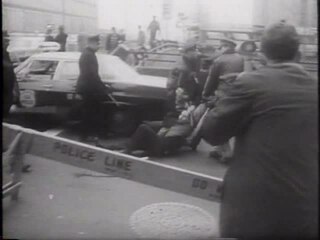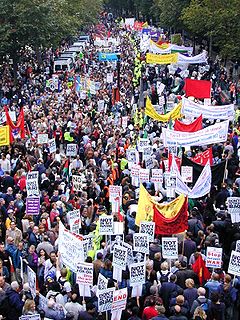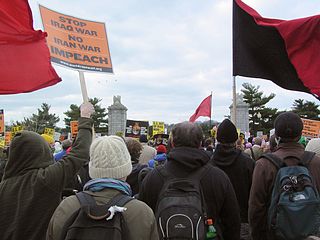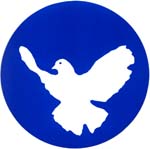 W
WA peace walk or peace march, sometimes referred to as a peace pilgrimage, is a form of nonviolent action where a person or group marches a set distance to raise awareness for particular issues important to the walkers.
 W
WOn 15 February 2003, a coordinated day of protests started across the world in which people in more than 600 cities expressed opposition to the imminent Iraq War. It was part of a series of protests and political events that had begun in 2002 and continued as the war took place. Social movement researchers have described the 15 February protest as "the largest protest event in human history".
 W
WThe January 27, 2007 anti-war protest was an anti-war march sponsored by United for Peace and Justice in Washington, D.C.. The official event consisted of a rally and march at the United States Capitol.
 W
WThe March 17, 2007 anti-war protest was an anti-war demonstration sponsored by ANSWER Coalition that marched from Constitution Gardens in Washington, D.C. to The Pentagon in Arlington, Virginia. The date was selected to coincide with the fourth anniversary of the invasion of Iraq, and also the 40th anniversary of a similar anti-war march on October 21, 1967. Organizers estimated 15,000 to 30,000 protesters attended, while the police gave informal estimates of 10,000 to 20,000.
 W
WThe September 15, 2007 anti-war protest was a march from the White House to the United States Capitol. It was organized by Veterans for Peace and the ANSWER Coalition. Volunteers were recruited for a civil disobedience action, which included a die-in. Volunteers signed up to take on the name of a soldier or civilian who died because of the war, and lay down around the Peace Monument. In attendance were public figures such as Cindy Sheehan and Ralph Nader. Police arrested more than 190 demonstrators who crossed police lines in front of the Capitol. Chemical spray was used by Capitol Police.
 W
WMarch 19, 2008 being the fifth anniversary of the United States 2003 invasion of Iraq and in protest and demonstration in opposition to the war in Iraq, anti-war protests were held throughout the world including a series of autonomous actions in the United States' capitol, Washington, D.C. in London, Sydney, Australia and the Scottish city of Glasgow with the later three being organized by the UK-based Stop the War Coalition. Actions included demonstrations at government buildings and landmarks, protests at military installations and student-led street blockades. The protests were notable, in part, for mostly replacing mass marches with civil disobedience – including religious-focused protests – and for utilizing new technologies to both coordinate actions and interface with traditional print and broadcast media.
 W
WThe European Peace Marches (EPM) arose from a Europe-wide network of initiatives within the Peace Movement. The Marches took place from 1978 to 1992, mobilizing large numbers of citizens especially in the early 1980s. Their aim was to protest the arms race and the growth of military spending. The campaign had many ties to the peace groups in the former German Democratic Republic and to the British Campaign for Nuclear Disarmament. It evolved out of the Ostermärsche organized by the German peace movement.
 W
WThe Lawyers' Movement, also known as the Movement for the Restoration of Judiciary or the Black Coat Protests, was the popular mass protest movement initiated by the lawyers of Pakistan in response to the former president and army chief Pervez Musharraf's actions of 9 March 2007 when he unconstitutionally suspended Iftikhar Muhammad Chaudhry as the chief justice of Pakistan's Supreme Court. Following the suspension of the chief justice, the Supreme Court Bar Association (SCBA) declared the judge's removal as an "assault on the independence of judiciary" and were backed by several political parties.
 W
WThe Olof Palme Peace March was a transnational peace march/demonstration that took place in the German Democratic Republic during September 1987.
 W
WThe World Is Bardo was the slogan and theme of a peaceful, anti-terrorist rally and march that took place on 29 March 2015 in Tunis, Tunisia. Thousands of Tunisians came out to protest the 18 March Bardo National Museum terrorist attacks by the Islamic State of Iraq and the Levant (ISIL) and to express support for the victims. Many world leaders participated to the event including François Hollande, Matteo Renzi, Bronislaw Komorowski, Mahmoud Abbas, Ali Bongo Ondimba, Abdelmalek Sellal, Charles Michel, Abdullah al-Thani, Federica Mogherini and Beji Caid Essebsi.
 W
WWomen of Liberia Mass Action for Peace is a peace movement started in 2003 by women in Monrovia, Liberia, Africa, that worked to end the Second Liberian Civil War. Organized by Crystal Roh Gawding and social workers Leymah Gbowee and Comfort Freeman, the movement began despite Liberia having extremely limited civil rights. Thousands of Muslim and Christian women from various classes mobilized their efforts, staged silent nonviolence protests that included a sex strike and the threat of a curse.
 W
WThe Women's Peace Crusade was a grass-roots socialist movement that spread across Great Britain between 1916 and 1918. Its central aim was to spread a 'people's peace', which was defined as a negotiated end to the First World War without any annexations or indemnities. The movement was first established in Glasgow in July 1916, and officially launched on 10 June 1917. It later spread across Great Britain, with demonstrations taking place in Leeds, Bradford, Leicester, Birmingham and Lancashire. Although it gathered a substantial following, the Women's Peace Crusade faced opposition from both the government and police, with members being arrested and reportedly threatened.